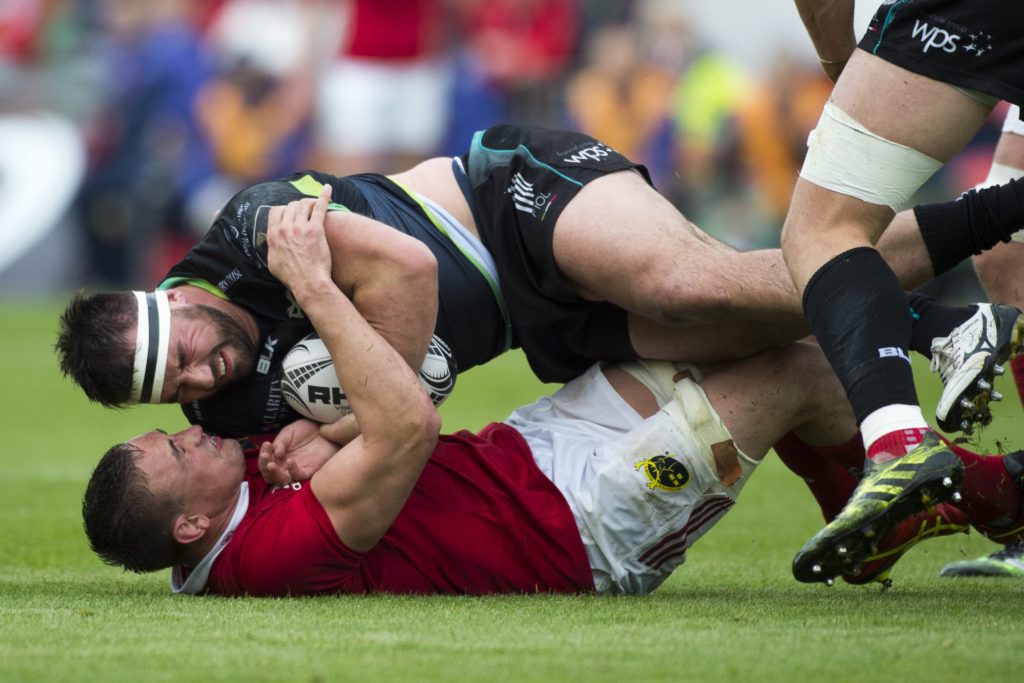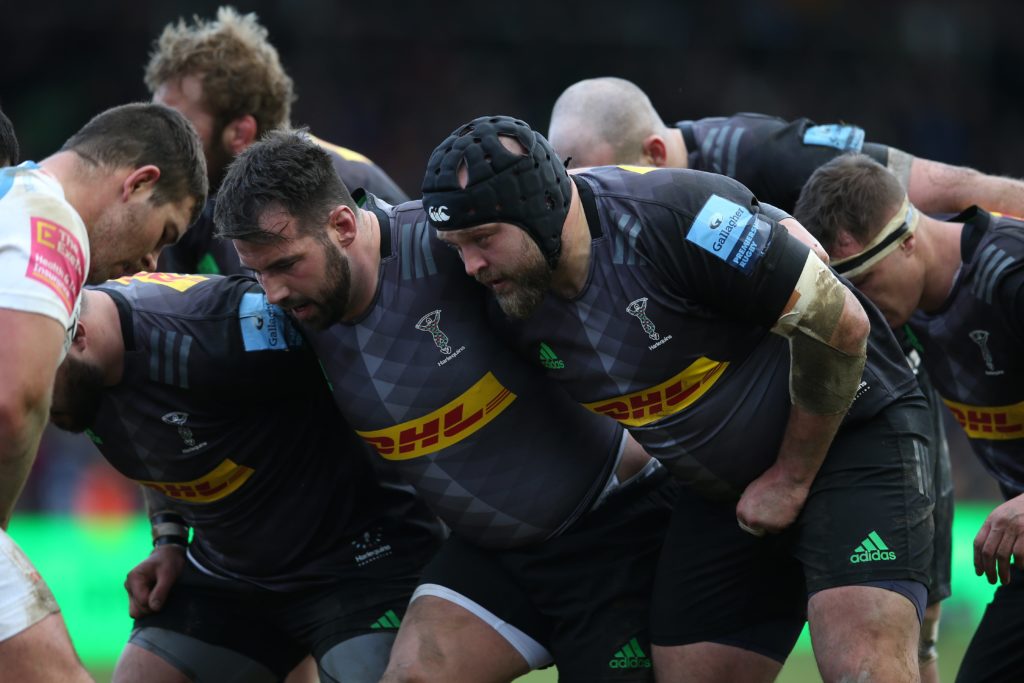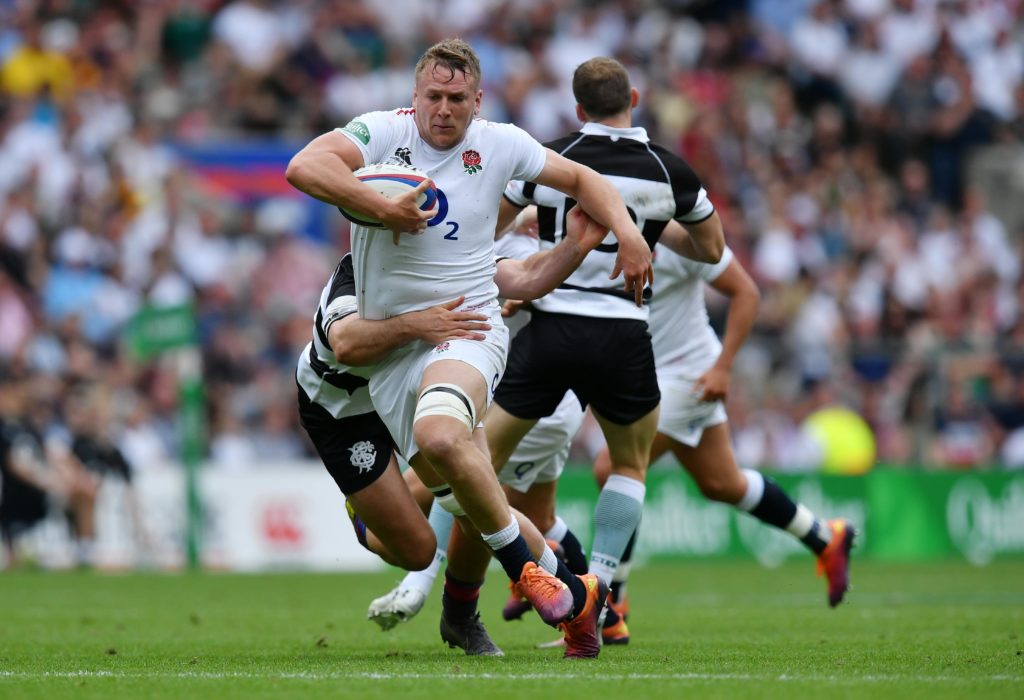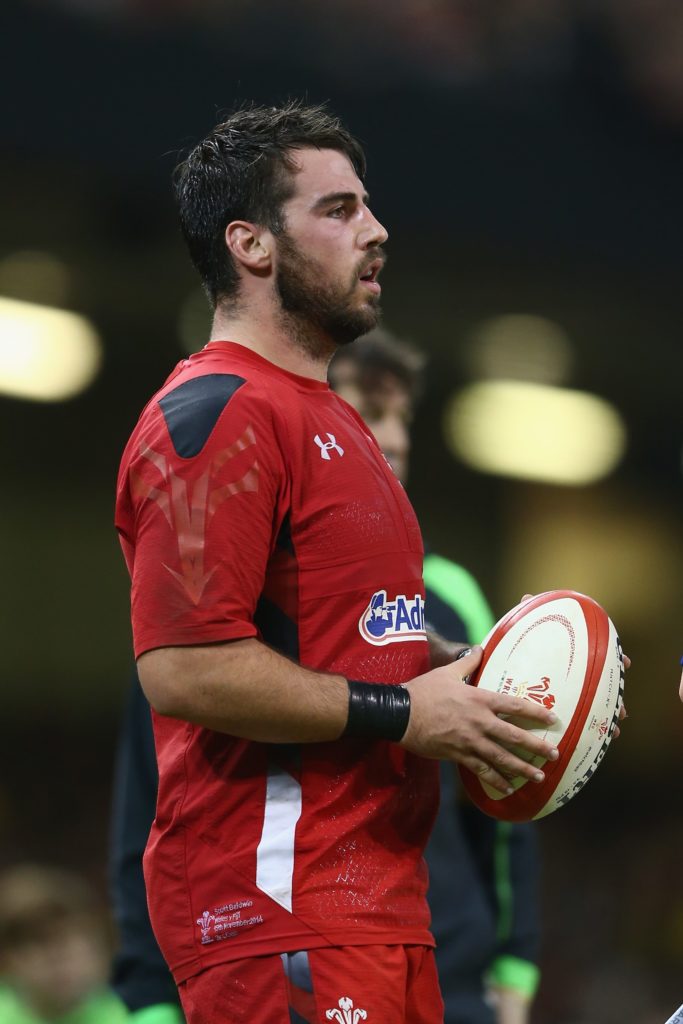As a 17-year-old, Scott Baldwin once woke up with a throbbing head, and a feeling of creeping dread anyone who’s had a serious skinful the night before will be all too familiar with. The difference between this and any other teenage hangover was that he was awoken by a police officer and, as his bloodshot eyes began to focus, he discovered he was locked in a cell. He had no idea why he was there, and little memory of the night before.
The policeman had to explain that he’d been involved in a fight, and had caused sufficient damage that their only recourse was to lock him up for the night. It wasn’t the first time the wayward Baldwin had lost his temper on a night out.
“I’d got into the habit of going out and being a nuisance,” Baldwin says. “Bridgend Athletic and Pencoed Rugby Club have never seen eye to eye, and everyone would end up out in Bridgend on a Saturday night, whether we’d played them or not. There’d almost always be a scrap, and when alcohol was involved, things escalated quickly.”
This incident served as an epiphany for the intemperate young rugby player. His combative, aggressive approach to the game with Bridgend RFC had caught the eye of the Ospreys scouts, and a professional contract had been put under his nose. He’d reached a turning point.
“Andrew Hore (Ospreys CEO) called me in and said ‘look mate we know you’ve got a bit of history with fighting and stuff, and we haven’t got an issue with your past, but if it happens again, we will release you from your contract.’ That came at exactly the right time, because I was close to going one of two ways. I definitely feel rugby put me on the straight and narrow.”
Ospreys called me in and said ‘look mate we know you have got a bit of history with fighting, and we haven’t got an issue with your past, but if it happens again, we will release you from your contract’.
His current surroundings in one of London’s most salubrious suburbs, where he plays for the quintessential English club, Harlequins, are a far cry from the streets of Bridgend. But rather than disown his past, he’s embraced it. His heart will always remain in the town of his birth, and his own experiences have encouraged him to reach out to others who may be approaching a similar metaphorical crossroads.
“I do quite a lot now to help youngsters. I’ve been to Parc Prison (in Bridgend) a few times to do some Q&As about my misspent youth. It’s driven by my desire to help young kids who’ve taken a wrong turn, not to be all ‘look where I am now’, but to persuade them that there are other options. Don’t let your past define you. You can make so many errors at a young age which can stick with you for a long time, but if you can accept where you went wrong and be open about it, most people will understand.”
As part of Baldwin’s plan to transition into coaching when his playing days are done, he arranged a coaching placement with Epsom College in Surrey. During the application process, he was asked if he had a criminal record. He said he didn’t, but a background check revealed a conviction for assault on a night out. He’d assumed that that had been wiped from his record as it happened when he was 17, and was embarrassed that it had come back to haunt him. The college hierarchy told him he could have it expunged from his record, as it was a juvenile conviction, but after a searching conversation with his wife, Sara, he decided against doing so.
“I’m not proud of it, and I should never have done it, but it’s part of my history and who I am. I felt that by getting it removed, I’d be hiding away from my past, and would come across as a hypocrite to those people in Parc Prison I was trying to help. I went back into the college and explained that I didn’t feel the need to do that; that the person I am now isn’t the person I was when I was 17, and that I’ve learned from the experience. That was a huge moment for me. Sara thought I should have had it wiped off, but when I explained it to her, she got it. I’d like to think I’ve turned my life around.”

Baldwin’s professional life has undoubtedly taken a turn in recent years. After a decade at the Ospreys, the abrasive hooker upped sticks and moved east in 2019, closing the door on a life-long association with his home region, and – simultaneously – on his international career. While a mere 150-odd miles separate Bridgend from Twickenham, they occupy different cultural universes, or so he thought.
“Initially, when I came here, I wasn’t myself . I was trying to be ‘normal’ I suppose, and not the mad Welshman. It’s an alien environment in many ways, especially when you see 18, 19 year old boys driving in brand new Mercedes, but the sooner I thought ‘be yourself’, the more comfortable I became. Most rugby environments all around the world are the same. The same bad humour, the same rubbish jokes. My perception of this place and the reality were poles apart.”
There is not one dickhead here. They’re all brilliant. One of my best mates here is Mike Brown, and I’d never have imagined that would have been the case.
As well as being a glamour club that plays in the shadow of England’s Twickenham stadium, Harlequins is also home to the biggest concentration of English players the Welsh love to hate. Mike Brown, Joe Marler, and Chris Ashton have all drawn the ire of Welsh fans down the years, and seem to revel in their roles as pantomime villains. But as Baldwin has discovered, reputations can be deceiving.
“There is not one dickhead here. They’re all brilliant. One of my best mates here is Mike Brown, and I’d never have imagined that would have been the case. The likes of Browny, and Danny (Care), they all take such a big interest in getting to know you. Yes, we have differences, but the similarities and the desire to win as teammates are clear to see. Mike is a bit like Sanjay (Liam Williams). You hate playing against him, but love playing with him. One of my first games for Quins was against Gloucester in the Premiership Cup. I started having a little tussle with their Number 8, Ackerman, and the first person to fly in was Mike Brown. He was straight in there, and I thought ‘this is it, this is what I signed for’. It’s no different to being back home.”

After suffering a pummelling against Exeter in round one, Harlequins appear to have found their rhythm with consecutive Premiership wins against Northampton and Gloucester. And at a time when rugby is sagging under the weight of accusations that it’s becoming overly-conservative and tactically dull, Harlequins are playing heads-up rugby, inspired by their baby-faced assassin at ten.
“Marcus Smith is unbelievably driven. You’d swear he’s 35-years-old with the head he’s got on his shoulders. He wants to attack every single play, and his energy is unbelievable. He’s not afraid to question players and coaches. If someone tells him he made the wrong decision, he’ll often say ‘I disagree’, but as long as he’s got a reason why, it’s encouraged. Then you’ve got Browny who’s really attack-focused as well, but he’s been around the block and knows when to rein it in a bit. And then you’ve got (Alex) Dombrandt who’s on fire at the moment. The only person I can compare him to is Justin Tipuric. He has an unbelievable skill-set. He’s big, he’s physical, and since I’ve been here, I’ve seen a massive evolution in his defensive game. When I first arrived he wasn’t really a line-out forward, but now he’s stealing line-outs off opposition ball. It’s a credit to him, and it’s a case of when not if he’ll play international rugby.”
It appears Dombrandt is destined to wear the red rose of England at test level. In fact he already has, scoring two tries in an uncapped match against the Barbarians last year. But there were those on the other side of the Severn who hoped he might opt for the red jersey having represented Wales at U20s level. That came about during his time as a student at Cardiff Met University, and Baldwin wonders if a bureaucratic loophole could be exploited.
“Because he didn’t pay council tax for three years, he didn’t get the Welsh residency. I told him to ring up Cardiff Council and ask if he could back pay three years. He’d be alright then. He could play for us! We’d have a Welsh back row of Toby, Tips and Dommers. That would be pretty special.”
He’s done it the best way – he’s been to Uni and enjoyed himself. He’s still got the mindset of ‘play’, rather than coming through an academy where they drive you to be a certain type of player.
Baldwin on his admiration for Alex Dombrandt
In Dombrandt, Baldwin sees a free spirit that unconsciously embraces a purer, more joyful approach to the game.
“He’s done it the best way – he’s been to Uni and enjoyed himself. He’s still got the mindset of ‘play’, rather than coming through an academy where they drive you to be a certain type of player. He’s got a free rein to attack and hit those lines, because he’s so good at it. The game’s gone so structured now, that young players coming through are being told who to carry at, they’re being told not to step – because if you step back inside, it’s a defensive win. So we’re producing robots. Quins has a mentality of play, play, play and it took me a long time to come around to it. I initially thought ‘we’re never going to win like this, it’s like playing for the BaaBaas every week.’ But it’s a mindset shift. There’s no right or wrong, it’s just how you’ve been coached and what’s instilled in you.”
Baldwin’s exposure to a new philosophy in West London has led to an improvement in his all-round game. He hesitates to call himself a better player than he was when he left Wales, but does consider himself far more consistent.

“The Premiership is so much more competitive at set piece. Everyone competes on your ball, everyone goes after you at scrum time, so you have to be on it every game. You can get away with putting the ball head height in the line-out in certain games in Pro14 whereas here if you do that here, nine times out of 10 you’re gonna lose the ball. There are elements of my game I’ve become more comfortable with, like being more of a ball player, but that’s not so much a skill as a mindset. At the Ospreys I was the player that carried into brick walls, whereas here I’ve become more of a link player. I’ve definitely become more comfortable with the attack side of things.”
So if he is a more rounded player than he was when he left Wales, logic would suggest he should be in a position to add to his tally of 34 caps. But he is 26 short of the sixty required for Welsh exiles to remain eligible for selection. While he understands the rationale behind the ruling, he thinks a more flexible approach should be applied.
“Playing for your country doesn’t necessarily show how much you’ve given to Welsh rugby. The rule has brought players back to Wales, but it’s also shrunk our player pool. I get the concept and think it’s a good one but it needs to recognise the time you’ve served to Welsh rugby as whole. That isn’t just playing for the national team. Look at Sam Parry. He’s only just broken into the Welsh team at the age of 29, but he’s played over 150 regional games. Because he’s broken in late, he can probably never leave Welsh rugby if he wants to continue to play for Wales. I don’t think that’s right. Look at Tomas Francis. He’s at the best team in Europe, won the Premiership, won the European Cup. I can’t understand why him coming back to Wales is going to make him a better player. Are the regions going to be competing in Europe over the next couple of years? What’s better for Tomas Francis and better for Wales is that he stays at Exeter Chiefs.”
Broadening your horizons, Baldwin says, helps accelerate your development. Rarely does a new challenge not lead to a fresh perspective.
Look at Tomas Francis. He’s at the best team in Europe, won the Premiership, won the European Cup. I can’t understand why him coming back to Wales is going to make him a better player.
“I didn’t have to reinvent myself here, but I had to prove myself in a fresh environment. At the Ospreys I could shirk out of contact training if I felt a bit sore, whereas up here, I’ve got a point to prove. This probably sounds bad but when I was playing for Wales, my mindset was going out not to play badly, rather than going out to play really well. When you’re a nobody, when you’re breaking in, you go out to impress. Then you become “a somebody” and there’s an expectation on you to hit your line-outs, and make your tackles. Subconsciously there’s a mindset shift. Instead of thinking ‘I’m going to go out there and express myself, and run over people’, you’re thinking ‘I hope I don’t screw up my line-outs’”
Absence, in this case, has made the heart grow fonder, and Baldwin’s renewed passion for the game has caused him to look longingly westward, in the hope things might change, and he can resume an international career that came to an abrupt and inconclusive end. He watches Wales as a fan, but also with the forensic eye of a coach, and rather than revel in a sense of schadenfreude that the set piece has begun to crumble in his absence, he’s keen to offer advice and support.
“I spoke to one of the hookers in the squad a couple of weeks ago before a game, and said ‘look mate, focus on you. You’re there for a reason, just back yourself and ignore the outside noise, because that’s all it is.’ I dropped him a message the day of a game. I remember Hibs (Richard Hibbard) did it to me before when I was playing for Wales. It’s only a little thing, but it can give you a boost knowing other players have been through that.

“It’s a tough place to be, especially in Wales. That’s one thing I’ve realised since leaving is how intense rugby is back home. That’s not to take away how much it means to English people, but it’s the number one sport in Wales. When there’s a test match on in Wales, whether you like rugby or not, you go out and watch the game and are expected to have an opinion on it. In England you can go out on a game day and no one has a scooby doo there’s a big match on.”
Baldwin’s English sojourn has clearly had a transformative effect. The hot-headed youngster with a short fuse, and a narrow view of the game has evolved into an intelligent, thoughtful man, and a more rounded, versatile player. The Baldwin you see now is far more likely to be wearing a broad grin than a furrowed brow, more likely to be offering his hand in fellowship than raising his fist in anger.
“I used to think you had to be really serious going into the game, but I’ve taken a leaf out of Bradley Davies’s book now. I have a laugh and a joke with the boys in the warm up. Even during the game I’ll sometimes make jokes with the opposition. Ultimately the more I enjoy rugby, the better I play.”
More from Ross Harries
If you’ve enjoyed this article, please share it with friends or on social media. We rely solely on new subscribers to fund high-quality journalism and appreciate you sharing this so we can continue to grow, produce more quality content and support our writers.


Comments
Join free and tell us what you really think!
Sign up for free